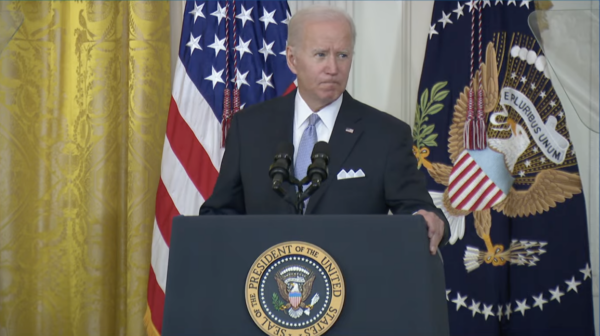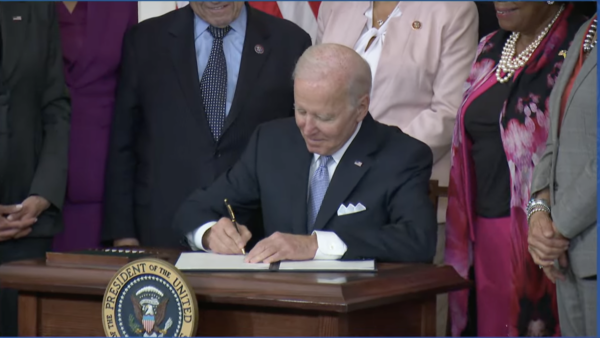After the Congress flopped on efforts to pass significant police reforms, President Joe Biden signed an executive order on Wednesday instilling extensive federal law enforcement policy changes.
Biden’s order, signed on the anniversary of George Floyd‘s death, creates new standards for using force, restricts chokeholds and no-knock warrants and creates a national police database of police conduct.

Civil rights activists say the order is a good start, but it is not enough to end police abuse across the nation.
“Having these words on paper will not be enough,” the American Civil Liberties Union said in a tweet. “The entire culture and mentality of policing must drastically shift in order to create meaningful changes.”
The president’s executive directs federal law enforcement agencies such as the FBI and Border Patrol agents to implement the reforms. It does not apply to local agencies, but state and local law enforcement agencies could likely adopt the practices for accreditation.
The order directs the attorney general to offer grant incentives to agencies that get the accreditation. Local and state agencies would also have access to the misconduct database.
Biden promised changes to policing in response to Floyd’s murder while on the campaign trail for the 2020 election. Floyd was killed on May 25, 2020, in Minneapolis, Minnesota, while ex-Minneapolis Police Officer Derek Chauvin knelt on his neck for over nine minutes.
The Black man’s death sparked global protest against police brutality and racial inequality in policing. Chauvin was convicted for Floyd’s murder in April 2021.
Biden initially called for Congress to pass the George Floyd Justice in Policing Act to overhaul police policies by the first anniversary of the man’s death. The bipartisan effort led by U.S. Sens.
Tim Scott of South Carolina, Cory Booker of New Jersey and Karen Bass of California died in September after disagreement over harsher penalties for police misconduct. It was approved in the House in March 2021.
“We know full well that an executive order cannot address America’s policing crisis the same way Congress has the ability to, but we’ve got to do everything we can,” NAACP President Derrick Johnson said. “There’s no better way to honor George Floyd’s legacy than for President Biden to take action by signing a police reform executive order.”
Executive orders are not legislation and can be overturned by Congress, the American Bar Association says. Congress also has the ability to pass legislation that might make it difficult to carry out the order, the legal association says.
Civil rights attorney Ben Crump said two days before Biden’s order that the Senate’s failure to pass “meaningful police reform” requires activists and families impacted by police violence to push harder on the state and local levels.
“Doing nothing is not acceptable because we’ve been to too many funerals,” Crump told the Washington Post’s Robert Samuels on May 23.
Crump, other civil rights attorneys and activists, and Floyd and Breonna Taylor’s relatives joined Biden at the White House to announce the executive order on Wednesday.
Taylor was killed when Louisville Metro Police officers shot her as they executed a no-knock warrant at her Kentucky apartment. Crump said that more than 50 cities and states have banned the warrants since the Black woman was killed in March 2020. Chokeholds have been banned in 150 cities and states since Floyd’s death, he said.
A White House official said that the Biden administration “started with the backbone” of the House bill and “went beyond” “in some places.” The measure comes after months-long consultations with police professional groups and activists.
“We were constrained by the inherent limits of executive authority,” the official said.
Biden said that he didn’t signed the executive order because he was worried that it would “undercut” the legislation.
“I’ve called on Congress to pass the George Floyd Justice in Policing Act, but Senate Republicans have stood in the way of progress,” Biden said. “That’s why this afternoon, I’m taking action and signing an executive order that delivers the most significant police reform in decades.”

Biden’s order bans federal agencies from using chokeholds and carotid restraints unless deadly force is authorized and only allows no-knock entries when announcing poses an “imminent threat of physical violence.” It also requires agents to wear body-worn cameras during arrests and searches and make the footage readily available to the public.
The order requires federal law enforcement agencies to adopt the Department of Justice’s new use-of-force guidelines announced on May 20.
“Officers may use force only when no reasonably effective, safe, and feasible alternative appears to exist and may use only the level of force that a reasonable officer on the scene would use under the same or similar circumstances,” it says.
Police groups had taken issue with an earlier version of the proposal that directed law enforcement to use deadly force “as a last resort when there is no reasonable alternative.” They believed the directive would create bigger risks for officers.
Under the order, the agencies would be charged with improving training, recruitment, hiring, discipline and promotion practices and policies. It expands the Obama administration’s restrictions on the transfer of military equipment and calls for an annual anti-bias training requirement.
Federal law enforcement agencies must also track use-of-force incidents and study the impact of the incidents on communities.
Biden ordered the attorney general and the secretary of Health and Human Services to issue guidance and secure funding to prioritize partnerships between law enforcement and mental health response teams in crisis calls. It also creates guidance for law enforcement’s use of a powerful sedative, ketamine, which has been disproportionately used on Black suspects.
Biden also calls for changes to the criminal justice system, including improving confinement conditions.
Representatives from federal agencies must form a committee to develop a plan that “advances front-end diversion, alternatives to incarceration, rehabilitation and reentry,” White House officials said.
Rev. Al Sharpton said the order was “an important step toward dealing with the issues of accountability and public safety.”
“The failure of the Senate to pass the George Floyd Justice in Policing Act is still something that we will never give up on,” Sharpton said.
“But an executive order will give us a step toward federal legislation and will set a tone in this nation that no one is above the law – and that no one in our society or those charged to protect society to have the knees on our necks.”


